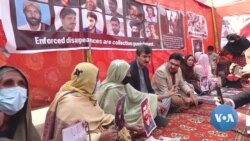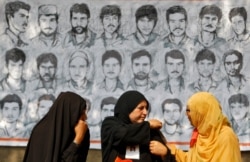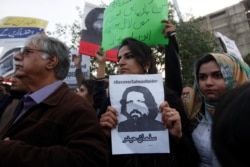Teary-eyed Bibi Aleema recounts the night many years ago when a group of men, some of them in uniform, stormed her house in Quetta, Pakistan. They were there to take away her son, Mohammad Salman, a gardener at the courthouse.
"I begged them not to take him," she says.
For a year, her son was missing without a trace. One day, someone told her his body was lying in the hospital with a bullet wound. He left behind two sons and a daughter.
Last year, her other son, Mohammad Hassan, a local health worker who had recently wed and had an infant son, went out shopping and was picked up.
"We have no more bread winners. What do we do? Where do we go? I don't even have anyone to bury me now," she says.
Aleema is one of several people camped outside the press club in Pakistan's capital, Islamabad, to draw attention to the issue. Many of them have had their relatives missing for years and have protested in various parts of the country without much success.
"Since the day my father was picked up, we've been protesting. We've grown up in front of Quetta press club, Karachi press club, Islamabad press club," says Sammi Din Baloch, daughter of Dr. Din Mohammad Baloch who was picked up in 2009.
Enforced disappearances have been a long-standing issue in Pakistan. Successive governments have tried, and failed, to resolve it.
Commission to trace the disappeared
In 2011, Pakistan set up a commission to trace disappeared people, find those responsible for their disappearance and take legal action.
According to the latest monthly report of the Commission of Inquiry on Enforced Disappearances (COIED), it has received nearly 7,000 cases and has resolved nearly 5,000 of them.
Activists disagree with the figures, claiming the real number of cases is much higher. They also disagree that the commission has resolved most of the cases.
"If someone died in custody, that is not a resolution," said Amina Masood Janjua, the chairperson of a group called Defense of Human Rights. She said relatives deserved justice. Her own husband disappeared in 2005.
In a September 2020 briefing paper, the International Commission of Jurors said COIED has "wholly failed to address entrenched impunity, leaving victims and their loved without any redress."
Relatives and activists have blamed the failure, despite promises by various governments and the intervention of courts at multiple levels, on the involvement of Pakistan's powerful military and intelligence agencies.
In August 2018, the chairman of the commission, Justice Javed Iqbal, told the Senate's human rights committee that 153 army personnel were found to be involved, according to multiple senators in that hearing.
Response from military
When approached for comment, the military's media cell referred VOA to the commission itself, saying that was the body legally mandated to investigate such cases.
In the past, the military has denied allegations that it was involved in enforced disappearances. Senior military officials including, years ago, former army chief General Pervez Musharraf, have said that many of the so-called missing were militants, who left home without informing their families, and that many were either hiding in neighboring Afghanistan, with separatist groups in the mountains of restive Baluchistan province or were killed during clashes with security forces.
In 2019, then-military spokesman Major General Asif Ghafoor tweeted that the military was unnecessarily blamed.
"Not every person missing is attributable to state. Many are there as part of TTP (Pakistani Taliban) in Afg/ elsewhere or got killed fighting as part of TTP. Those with state are under legal process," he said.
International human rights groups, including the United Nations Office of the High Commissioner for Human Rights, have called on Pakistan to bring the practice to an end.
"We are extremely concerned by the authorities' continued practice of enforced disappearance, leaving thousands of cases unresolved in the country," said a June 2020 statement from the office.
Local media reported that earlier this month, Prime Minister Imran Khan said in a cabinet meeting that his government did not want any person to remain missing and directed relevant authorities to resolve the issue.
Days after that statement, said some of the relatives sitting in Islamabad this week, the commission on disappearances, at a hearing in Quetta, harshly told them to stop coming back to it for answers.
"The judge told me if you weren't a woman, I would have kicked you out. You don't know how to behave," says Seema Baloch, who claims her brother was picked up in 2016 in front of his wife.
VOA approached the commission for a response but was informed of a lengthy process for answering such an inquiry that could have taken several days or weeks. VOA will update its story as and when it receives a response from the commission.








